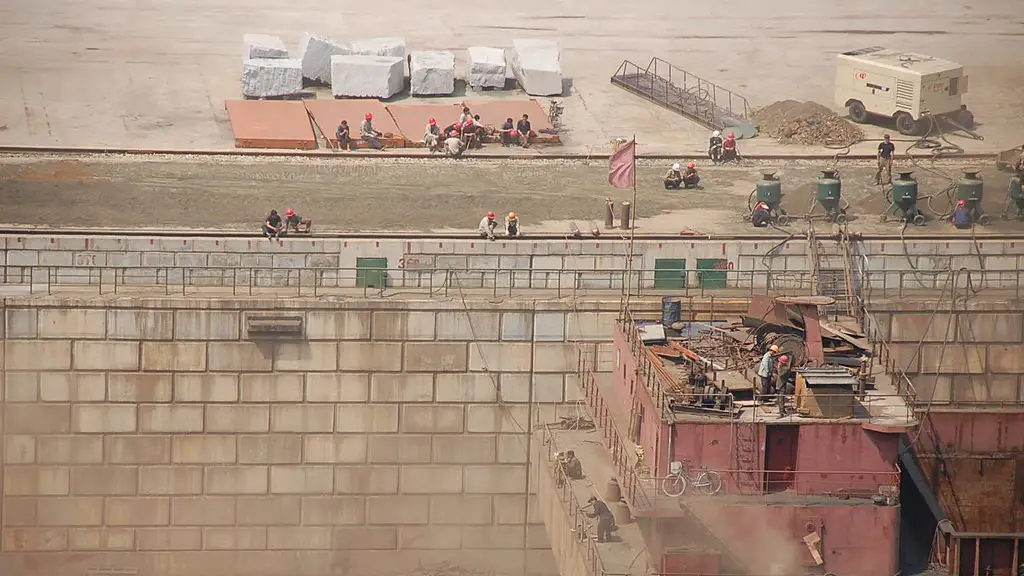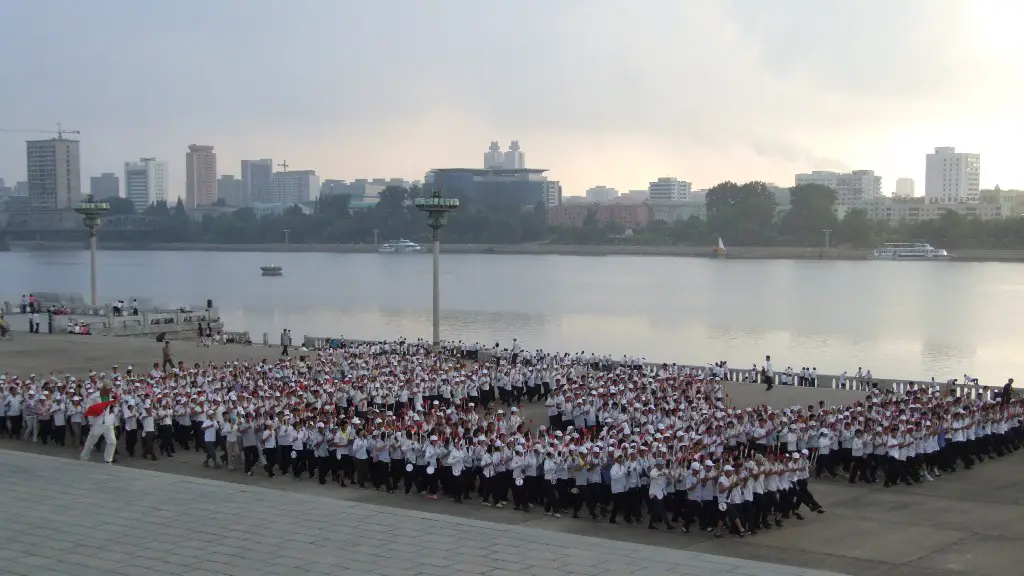In the past couple of years, the relationship between North Korea and the United States has been in a state of flux. What’s been happening between these two countries is a complex mix of issues and difficult decisions. As tensions rise, it is important to understand the context of this uneasy relationship and the implications of current events.
The historical relationship between North Korea and the United States has been a sour one. The Korean War of 1950-1953 resulted in a long history of animosity, leading to the formation of a Korean Demilitarized Zone (DMZ) as a buffer between North and South Korea. To this day, the two countries remain divided, and the US maintains military forces in South Korea. Despite some attempts at peaceful negotiations, North Korea has made few commitments to cooperate with the US and its allies, and has been met with harsh economic sanctions and strict scrutiny from the international community. North Korea has also been adept at exploiting the political environment in order to pursue its own interests.
In recent months, the situation between North Korea and the United States has become increasingly precarious. In response to North Korea’s continued testing of nuclear weapons and ballistic missiles, the US has imposed harsh economic sanctions, straining the already precarious state of the North Korean economy. President Donald Trump recently declared a “maximum pressure” campaign against North Korea, and rumors have been circulating that the US is preparing for a possible pre-emptive military strike. The international community has responded with a mixture of apprehension and condemnation, as a conflict with North Korea could easily spiral out of control and cause a humanitarian crisis in the region.
American experts are divided in their views on the current standoff. Some argue that a diplomatic solution is the only viable option, and urge the US to continue to apply economic pressure and diplomatic pressure on North Korea. Others argue for a more aggressive approach, believing that North Korea must be disarmed of its nuclear weapons in order for the US and its allies to maintain security in the region. While there is no clear consensus on the best course of action, it is clear that there is a need for urgent action.
Despite its oppressive regime, North Korea is not without its own human rights concerns. The North Korean government is known for its horrific treatment of political prisoners, and reports of public executions, forced labor, and other grotesque violations of human rights are unfortunately all too common. The US and its allies have strongly condemned these abuses, and have called for an end to the regime’s oppressive rule.
As the US and North Korea continue to grapple with their differences, it remains to be seen how their relationship will play out in the coming months and years. As both countries possess nuclear weapons and the capability to launch ballistic missiles, there is a strong sense of unease in the international community. The future of this conflict is uncertain, but understanding its history and current context is essential in order to ensure a peaceful resolution.
China’s Role In The Conflict
China has played a crucial role in the conflict between North Korea and the United States. As a major economic player and military power in the region, China has considerable influence over North Korea, even though China does not officially recognize North Korea as an ally. As a result, China is an essential partner for the US in diplomatically resolving the conflict. China has urged North Korea to pursue peaceful negotiations and has also imposed economic sanctions on North Korea in order to pressure the regime into changing its policies.
At the same time, China has been criticised by many analysts for not doing enough to pressure North Korea. China is reluctant to take a hard stance against its northern neighbor, as doing so could potentially destabilize the region, putting China’s own economic interests at risk. China’s relationship with the US has also become strained due to the US’s criticism of China’s policies in the South China Sea, further complicating the situation.
Despite these tensions, China has expressed a willingness to work with the US on de-escalating the conflict with North Korea. In recent months, China has taken steps to work with the US on containing North Korea’s nuclear ambitions, including taking steps to unilaterally enforce UN sanctions against the North Korean regime. It remains to be seen how effective China’s diplomatic efforts will be in resolving the conflict, but it is clear that Chinese involvement is indispensable in avoiding a full-scale war.
The Humanitarian Crisis
The conflict between North Korea and the United States has been a cause for serious concern for humanitarian organizations. The actions of both countries have had devastating effects on the North Korean people. North Korea is one of the most impoverished nations in the world, and the economic sanctions imposed by the US and its allies have had a disastrous effect on the country’s already struggling economy. Reports of food shortages and widespread poverty are common, and many North Korean citizens have been forced to flee the country in search of a better life.
At the same time, North Korea’s oppressive regime has made it almost impossible for humanitarian groups to provide assistance. Many organizations have noted that the Kim regime has actively blocked their efforts, and the UN has made it clear that it will not provide aid unless North Korea agrees to specific reforms. As a result, there has been an outcry of international demands for the North Korean government to allow effective aid to reach its citizens
Moreover, the international community has expressed concern over the potential for war in the region. In the event of a conflict, the North Korean people would likely be among the first to suffer, as they lack the means to defend themselves. A war would also have a devastating effect on the region, destroying infrastructure and exacerbating already severe economic and humanitarian conditions.
The Potential Effects of Its Resolution
The resolution of the tensions between North Korea and the United States could have far-reaching implications for global security and stability. If North Korea and the US were able to peacefully resolve their differences, it could be a major victory for diplomacy. Furthermore, a peaceful resolution could pave the way for greater cooperation between the two countries, potentially leading to a greater level of stability in the region. This could potentially open the door for North Korea to cooperate with its neighbours and the international community, potentially leading to a new era of prosperity for the North Korean people.
On the other hand, a resolution could be difficult to achieve in the short term, as US and North Korean relations have been characterized by mistrust and antagonism for many years. The US’s “maximum pressure” campaign against North Korea has been met with resistance, and North Korea has continued to develop its nuclear capabilities despite international condemnation. There is a risk that a breakdown in diplomatic efforts could lead to a full-scale war, a scenario that all parties have been hoping to avoid.
In any case, it is clear that the resolution of the standoff between North Korea and the United States is essential in order to ensure a peaceful future for the region. As both countries possess nuclear weapons, the potential implications of a full-scale war are too terrible to imagine, and all parties must work together towards a peaceful resolution.
Outside involvment
The conflict between North Korea and the United States has also been met with concern and criticism from other countries around the world. Many nations have condemned North Korea’s nuclear proliferation and called for a peaceful resolution to the standoff. Countries such as China, South Korea, Russia, and Japan, all of whom share a border with North Korea, have expressed their desire for the conflict to be peacefully resolved, as they fear the consequences of a war in the region.
At the same time, other countries have also taken steps to mediate the conflict. In recent months, South Korea’s President Moon Jae-in has made efforts to engage North Korea in diplomatic talks, leading to a historic meeting between the two leaders in April. South Korea is also actively pushing for a peace treaty to officially end the Korean War, and is offering economic assistance to the North Korean people in exchange for the Kim regime’s cooperation.
Russia has also played an active role in the diplomatic effort, hosting talks between North Korea and the United States in Moscow. Russia has offered its support to both sides in the conflict, and has urged them to find a peaceful solution to their differences. In addition, Russia has also pushed for North Korea to be included in the Six-Party Talks, an international diplomatic effort to resolve the crisis.
Other countries, such as Japan and China, have also offered their support to the diplomatic efforts. China has played an especially important role in mediating the conflict, as it shares a long border with North Korea and has considerable economic leverage over the regime. Japan, on the other hand, has also put forward diplomatic initiatives, urging North Korea to renounce its nuclear ambitions.
The US Allies’ Perspective
In addition to the involvement of other countries, the US’s allies have also expressed their concern over the conflict between North Korea and the US. Countries such as South Korea and Japan, both of whom have a long history of conflict with North Korea, have called for a peaceful resolution to the conflict. South Korea’s President Moon Jae-in has strongly criticized North Korea for its nuclear proliferation, and Japan has urged North Korea to renounce its nuclear weapons.
The US’s allies have also been wary of potential military action from the US. South Korea and Japan have both asserted that any military action against North Korea must be approved by their respective legislatures, as they fear the consequences of a war in the region. As such, they have urged the US to pursue a diplomatic resolution to the conflict, rather than resorting to military action.
Furthermore, the US’s allies have urged the US to work with the international community in order to resolve the conflict. South Korea and Japan have both called for the US to engage in multilateral talks with North Korea, involving China, South Korea, Russia and other countries in the region. They believe that a multilateral approach is the only way to achieve a peaceful resolution to the conflict.
The Role Of Activism
In addition to governments and institutions, civil society organisations have also been involved in the conflict between North Korea and the United States. Human rights organisations have been pushing for North Korea to address its egregious human rights abuses. Furthermore, international aid organisations have been advocating for the North Korean people, calling on the US and its allies to provide humanitarian assistance in exchange for North Korea’s cooperation.
The conflict between North Korea and the United States has also inspired activism from the North Korean diaspora community around the world. North Korean exiles have been active in pushing for a peaceful resolution to the conflict, and have engaged in demonstrations outside the US Embassy in Seoul in order to raise awareness of the situation. Furthermore, they have also been active in lobbying governments and institutions to take a tougher stance on North Korea’s nuclear ambitions.
At the same time, the North Korean diaspora has also been pushing for the US to soften its stance on the North Korean regime. They have argued that the US should provide aid to North Korea in exchange for reforms and the unrestricted entry of aid organisations into North Korea. They have also called for the lifting of





